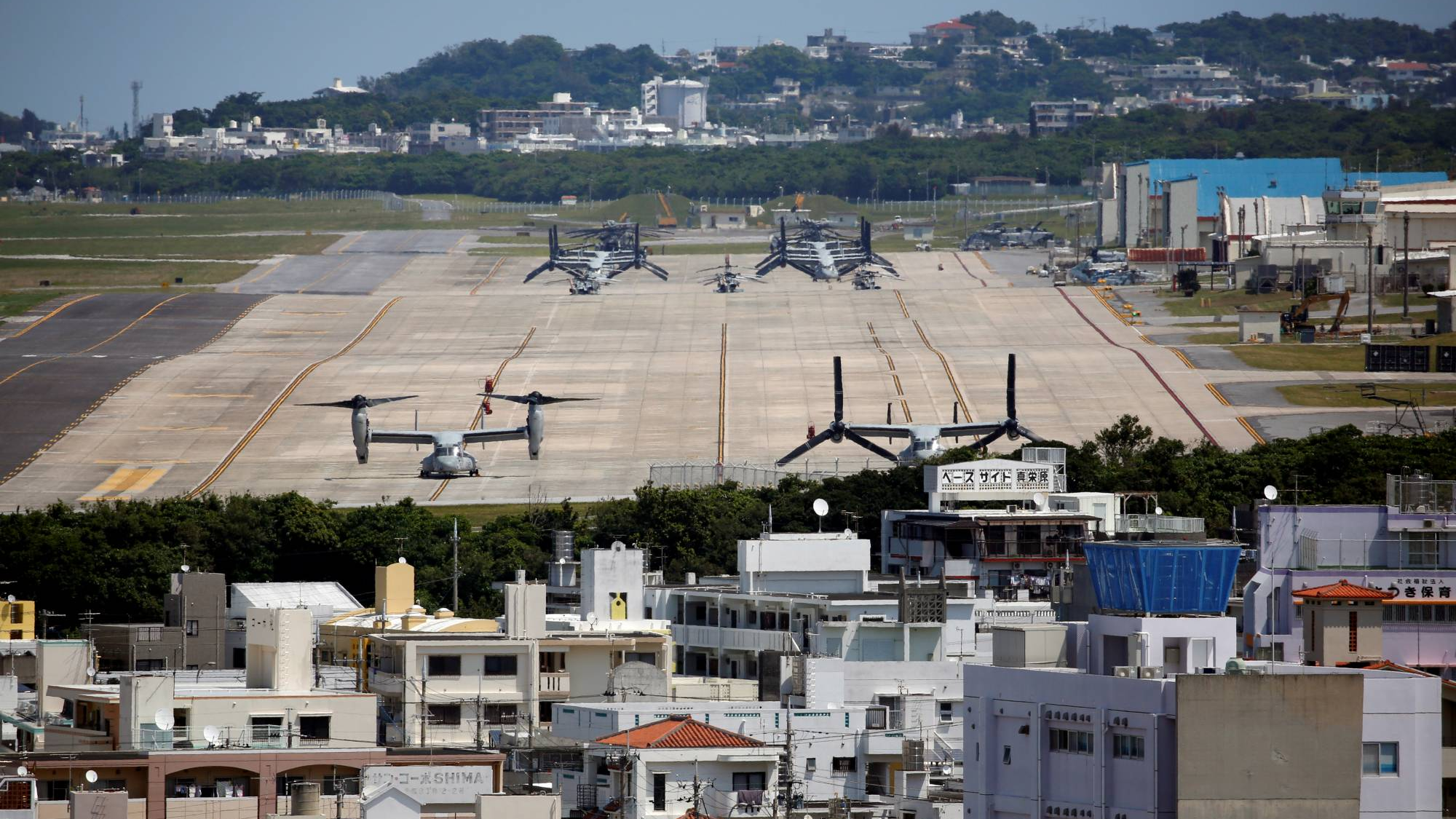
MV-22 tilt-rotor Ospreys are seen at the U.S. Marine Corps' Air Station Futenma in Ginowan, Okinawa Prefecture, in March 2018. /Reuters
MV-22 tilt-rotor Ospreys are seen at the U.S. Marine Corps' Air Station Futenma in Ginowan, Okinawa Prefecture, in March 2018. /Reuters
At the school entrance ceremonies on April 7, students across Okinawa were filled with excitement while waiting for their names to be called. Instead of hearing their names, the students began to cover their ears as the deafening sound from U.S. military CH-53E heavy lift helicopter pierced through the sky.
Despite having received requests from local officials to pause flights for the schools' reopening, the U.S. military proceeded with its helicopter missions that flew low above public and elementary schools in Okinawa. For many local residents, the thundering noise is more than enough to send chills down their spines.
Just four years earlier, a metal-framed window fell off the same type of helicopter that struck the playground of an elementary school. Luckily, only one student was injured. The event unleashed yet another wave of anti-U.S. rage as a similar incident had just occurred on the island two months prior.
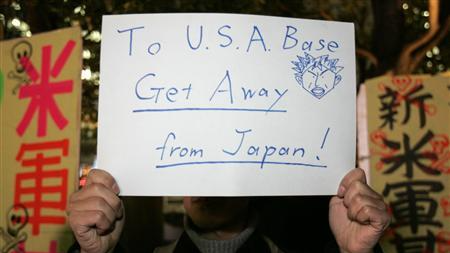
People protest in front of a U.S. camp against the suspected rape of a 14-year-old Japanese girl by U.S. Marine Tyrone Hadnott in Okinawa February 12, 2008. /Reuters
People protest in front of a U.S. camp against the suspected rape of a 14-year-old Japanese girl by U.S. Marine Tyrone Hadnott in Okinawa February 12, 2008. /Reuters
As Japan's southernmost prefecture, Okinawa is consisted of the Ryukyu Islands, which are located closer to Taiwan than the rest of the country. Their unique geographic location has been a key part of Washington's strategy in the Pacific, especially as it looks to maintain its waning hegemonic status in the face of a rising China. But for the hundreds of thousands of its residents, sharing their islands with American troops has meant nothing but pain.
"U.S. and Japan just see Ryukyu as their own personal military resort. They couldn't care less about Ryukyuans," Robert Kajiwara, a local activist who has organized protests, filed petitions and gave a speech at the United Nations on issues surrounding the Ryukyu Islands, told CGTN.
"If Ryukyuans were to die and go extinct, they would be totally okay with that because then they'll have the whole island for themselves to build more bases and there will be no one to stop them or protest."
To minimize casualty caused by the crashing American helicopters, schools such as the Futenma No.2 Elementary School have been using its broadcast system alerting the children to take cover each time a U.S. aircraft approaches. Over a seven-month period, the children were forced to seek shelter over 670 times. In a 45-minute class one day, they had to do so five times, according to Japanese newspaper The Asahi Shimbun.
Principal of the school, Katsuji Chinen, said he's worried that the children have grown too used to the noise of American jets and helicopters that they are becoming complacent to the dangers they pose.
"The environment you now live in is not the standard," Chinen said during a symposium aimed at reminding the children of past U.S. military accidents. "You must keep thinking of dangers that may occur tomorrow."
Over the decades, the U.S. has constructed 33 military installations in Okinawa – whose size is roughly that of Los Angeles – taking up to a quarter of the total land area from its inhabitants. The high concentration of troops and military equipment have polluted the environment, stunned economic growth while being responsible for a series of deadly accidents and assaults, including the murder and rape of women and teenagers.
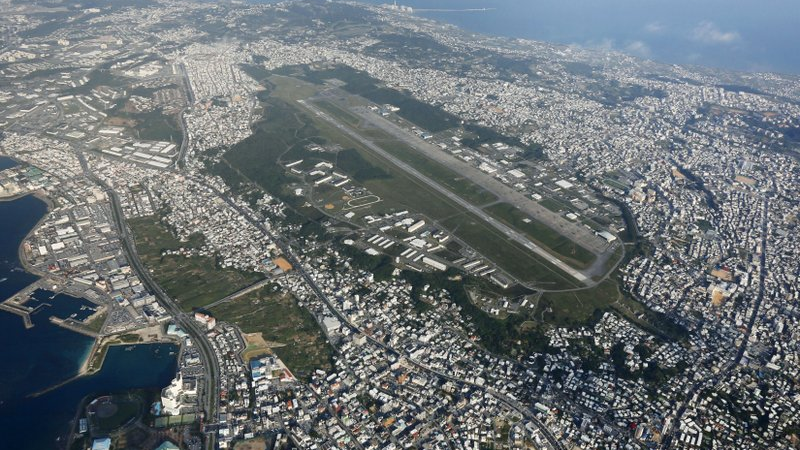
This October 2015 aerial file photo shows U.S. Marine Corps Air Station Futenma in Ginowan, Okinawa, southern Japan. /AP
This October 2015 aerial file photo shows U.S. Marine Corps Air Station Futenma in Ginowan, Okinawa, southern Japan. /AP
"The right to self-determination, human rights, freedom and democracy have been taken away by the foreigners from the native people," Hoshin Nakamura, Professor Emeritus of Okinawa University, told CGTN.
On the night of September 4, 1995, three American servicemen snatched a 12-year-old Okinawan schoolgirl off the street and raped her in the back seat of a rented car. To subdue the sixth-grader, the soldiers beat her face and stomach and used adhesive tape to cover the victim's eyes and mouth and bind her hands and feet.
The case is one of roughly 350 horrific rape cases detailed in a booklet by the Okinawan Women Act Against Military Violence, a civic group which aims to document sexual assault cases involving U.S. troops and draw public attention to the issue. Suzuyo Takazato, who co-chairs the group, says only a fraction of sex crime cases come to the surface as many women remain silent about their suffering due to stigma associated with rape, according to Asahi Shimbun.
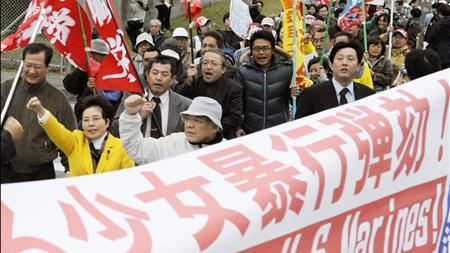
People protest in front of a U.S. camp against the suspected rape of a 14-year-old Japanese girl by U.S. Marine Tyrone Hadnott in Okinawa, February 12, 2008. /Reuters
People protest in front of a U.S. camp against the suspected rape of a 14-year-old Japanese girl by U.S. Marine Tyrone Hadnott in Okinawa, February 12, 2008. /Reuters
After defeating Japan in the brutal Battle of Okinawa, the islands came under American control until 1972, and today hosts around 26,000 U.S. military personnel, which is around half of all the U.S. forces stationed in Japan. After World War II, the islands have witnessed many nerve-wracking military accidents.
In 1959, the U.S. military accidentally shot a nuclear warhead into the local harbor; six years later, it lost a hydrogen bomb in the nearby seas; In 1969, a leak of Sarin gas led to over 20 servicemen being exposed to the nerve agent. But none is as alarming as the the leak of cancer-inducing chemicals from the Kadena Air Base discovered by local officials in 2016.
The contaminated drinking water is supplied to seven municipalities – home to 450,000 Okinawans, thousands of U.S. service members and their families, and millions of international tourists, according to British investigative journalist Jon Mitchell, who has detailed the incident in his book "Poisoning the Pacific: The U.S. Military's Dumping of Plutonium, Chemical Weapons, and Agent Orange."
After holding numerous mass protests over the years to no avail, many Okinawans now feel abandoned by the Japanese central government, which has prioritized its alliance with the U.S. over the wish of its own citizens.
"Japanese leader have a habit of obeying and following the stronger nation than them as they did during the Sui and Tang dynasties of China. Japan lost the war against the USA that is regarded stronger than Japan now," professor Nakamura said.
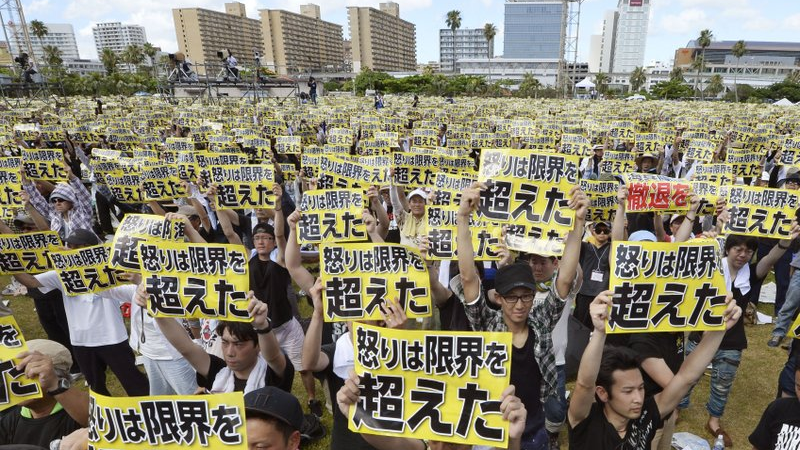
Protesters hold placards that read: "Our anger has reached its limit" during a protest rally against the presence of U.S. military bases on the southwestern island of Okinawa in Naha, Okinawa, Sunday, June 19, 2016 as many of them wearing black to mourn the rape and killing of a local woman in which a former U.S. Marine is a suspect. /AP
Protesters hold placards that read: "Our anger has reached its limit" during a protest rally against the presence of U.S. military bases on the southwestern island of Okinawa in Naha, Okinawa, Sunday, June 19, 2016 as many of them wearing black to mourn the rape and killing of a local woman in which a former U.S. Marine is a suspect. /AP
Kajiwara pointed out the long history of discrimination experienced by Ryukyuans – who are ethnically different from Japanese – as the reason why Okinawa has been getting the short end of the stick.
For much part of its history, the islands were ruled under an independent Ryukyu Kingdom – a tributary state to of China and a wealthy trade hub that connected maritime trade routes of medieval East Asia and South East Asia.
The kingdom also had its own unique culture and language which are different from those of Japan's.
In 1879, the Japanese annexed and dissolved the kingdom through force and formed the Okinawa Prefecture. Since then, Ryukyuans were forced to learn Japanese and adapt Japanese customs and traditions. Many faced discrimination while searching for jobs and apartments.
In an effort to promote the Ryukyuan identity and shed a light on the issues surrounding the Ryukyu Islands, Kajiwara founded the Peace for Okinawa Coalition.
"A lot of Ryukyuans have simply buried their anger – especially the older generation who have put up with this for so long. They know not to expect any change," he said.
"When the U.S. talks about democracy and human rights, it's all lies and propaganda, we don't believe it at all."

